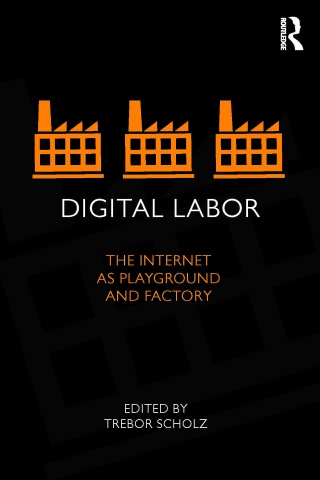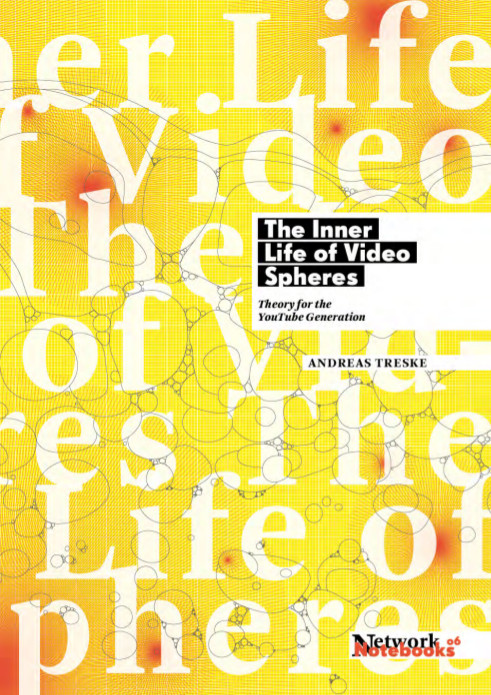Trebor Scholz (ed.): Digital Labor: The Internet as Playground and Factory (2012)
Filed under book | Tags: · biopolitics, gift economy, internet, labour, neoliberalism, participation, play, playbour, politics, social media, technology, value, web, youtube

“Digital Labor calls on the reader to examine the shifting sites of labor markets to the Internet through the lens of their political, technological, and historical making. Internet users currently create most of the content that makes up the web: they search, link, tweet, and post updates—leaving their “deep” data exposed. Meanwhile, governments listen in, and big corporations track, analyze, and predict users’ interests and habits.
This unique collection of essays provides a wide-ranging account of the dark side of the Internet. It claims that the divide between leisure time and work has vanished so that every aspect of life drives the digital economy. The book reveals the anatomy of playbor (play/labor), the lure of exploitation and the potential for empowerment. Ultimately, the 14 thought-provoking chapters in this volume ask how users can politicize their troubled complicity, create public alternatives to the centralized social web, and thrive online.”
Contributors: Mark Andrejevic, Ayhan Aytes, Michel Bauwens, Jonathan Beller, Patricia Ticineto Clough, Sean Cubitt, Jodi Dean, Abigail De Kosnik, Julian Dibbell, Christian Fuchs, Lisa Nakamura, Andrew Ross, Ned Rossiter, Trebor Scholz, Tizania Terranova, McKenzie Wark, and Soenke Zehle.
Publisher Routledge, 2012
ISBN 0415896959, 9780415896955
258 pages
Reviews: Sebastian Sevignani (triple C, 2013), Andreas Wittel (Inf, Comm & Soc, 2014), Stephanie Anne Brown (Transformative Works & Cult, 2014), Gregory J. Downey (J Assoc Info Sci & Tech, 2015).
Conference (2009, from Archive.org)
Next conference (14-16 Nov 2014, CfP)
Publisher
Andreas Treske: The Inner Life of Video Spheres. Theory for the YouTube Generation (2013)
Filed under book | Tags: · online video, social media, video, youtube

Video is everywhere, like a space in which we move, an ocean we can dive into. But video is no longer the video we once knew. To address this techno-social shift, Andreas Treske sketches the outlines for a philosophical and practical understanding of online video, offering up a theory for the YouTube generation.
Video is examined up close and as a societal phenomenon. The images of a video constantly refer to other images, to the user and to the world outside. There is a ‘thickening of the image’. Videos also exist in relation to each other. On YouTube each video is accompanied by dozens of suggestions commercials and comments. Or consider TED-talks: every presentation refers to many others, all connected in a network and easily changing from one hype to the next.
Useful for comprehending this relational context is the philosophy of Peter Sloterdijk, who describes human society in terms of ‘spheres’. Online video can be understood as similar to bubble stuck to other bubbles, coming together to from foam within the connected sphere of the human environment.
Most prominent effects so far is video as a means of protest in the squares of the world, where revolution is filmed an uploaded in real time. Video isn’t a defined movie-object watched individually, but a movement of millions of video simultaneously, causing a cascade of reaction throughout the world.
Publisher Institute of Network Cultures, Amsterdam, February 2013
Network Notebooks 06
Creative Commons Attribution-NonCommercial-NoDerivs 3.0 Unported License
ISBN 9789081857536
56 pages
Michael Mandiberg (ed.): The Social Media Reader (2012)
Filed under book | Tags: · blogging, copyright, free culture, hacking, indymedia, internet, labour, memes, open source, peer production, phreaking, social media, social networks, wikipedia, youtube

With the rise of web 2.0 and social media platforms taking over vast tracts of territory on the internet, the media landscape has shifted drastically in the past 20 years, transforming previously stable relationships between media creators and consumers. The Social Media Reader is the first collection to address the collective transformation with pieces on social media, peer production, copyright politics, and other aspects of contemporary internet culture from all the major thinkers in the field.
Culling a broad range and incorporating different styles of scholarship from foundational pieces and published articles to unpublished pieces, journalistic accounts, personal narratives from blogs, and whitepapers, The Social Media Reader promises to be an essential text, with contributions from Lawrence Lessig, Henry Jenkins, Clay Shirky, Tim O’Reilly, Chris Anderson, Yochai Benkler, danah boyd, and Fred von Loehmann, to name a few. It covers a wide-ranging topical terrain, much like the internet itself, with particular emphasis on collaboration and sharing, the politics of social media and social networking, Free Culture and copyright politics, and labor and ownership. Theorizing new models of collaboration, identity, commerce, copyright, ownership, and labor, these essays outline possibilities for cultural democracy that arise when the formerly passive audience becomes active cultural creators, while warning of the dystopian potential of new forms of surveillance and control.
Publisher NYU Press, 2012
Creative Commons Attribution NonCommercial ShareAlike (CC BY-NC-SA) license
ISBN 0814763022, 9780814763025
289 pages

